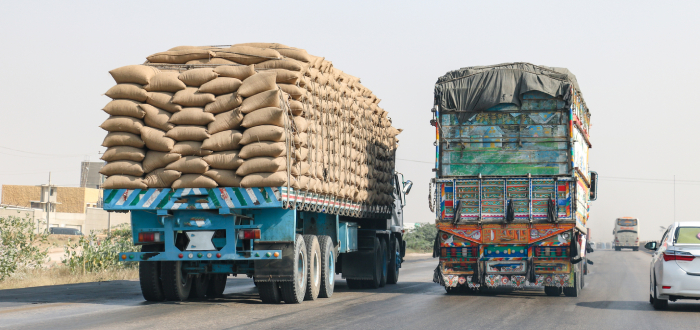Improperly loaded and overloaded trucks can have significant consequences. Truck accidents are often some of the most devastating that occur on the road, particularly due to the sheer weight and size of these vehicles. As a result, trucks can cause serious injuries, resulting in hospitalization, surgery, and long-term care. Not only are the lives of the injured affected, but a financial and emotional toll is taken on the lives of their families as well. The skilled personal injury lawyers at Gautreaux Law will make sure your interests are protected if you have been injured as a result of an overloaded or improperly loaded truck.
Improperly Loaded Truck Issues
Truck accidents may be caused by the following loading issues:
- Overloading Issues – If the cargo is hanging over the sides of the truck or stacked over the top, it is probably carrying more cargo than it should be.
- Incorrectly Distributed Issues – If the cargo is incorrectly distributed, it can affect the handling and cause damage to the truck itself and its tires. Too much or too little weight on the steering axle can cause a dangerous steering situation. Incorrectly distributed loads on trucks could also lead to the truck tipping over.
- Unsecured Cargo Issues – Cargo that is not secured properly can cause the load to shift or slide around on the truck and affect the handling of the vehicle. If cargo happens to fall off the truck, it can create a road hazard.
Overview of Georgia’s Laws and Regulations That Govern Truck Accidents
In Georgia, several laws and regulations govern truck accidents that occur due to overloading or improper loading. These laws are designed to ensure safety on the roads and to assign responsibility in the event of an accident caused by such issues. Key aspects include:
- Federal Motor Carrier Safety Regulations (FMCSR): Trucks operating in Georgia, like in other states, must adhere to the FMCSR, which includes specific rules on cargo securement and weight limits.
- State Regulations on Weight Limits: Georgia has specific weight limits for trucks operating within the state. These limits are enforced to prevent overloading, which can lead to accidents due to mechanical failure or loss of control.
- Cargo Securement Laws: Certain laws specify how cargo should be properly secured on a truck. Improper loading can lead to shifting cargo, which might cause the truck to become unstable or lose cargo on the roadway, leading to accidents.
- Regular Inspections: Trucks are subject to regular inspections to ensure they meet safety standards, including those related to cargo loading and weight limits.
- Commercial Driver’s License (CDL) Requirements: CDL holders are expected to be knowledgeable about safe loading practices. Violations can lead to penalties and might impact the driver’s CDL status.
- Insurance Requirements: Commercial trucks are required to have insurance that may cover damages resulting from accidents, including those caused by overloading or improper loading.
- Penalties for Violations: Violating these laws and regulations can result in penalties, including fines, suspension of operating licenses, and in severe cases, criminal charges. The trucking company itself may face penalties and legal actions, not just the driver. This can include fines, as well as increased scrutiny from regulatory bodies.
In the event of an accident caused by overloading or improper loading, these laws are used to determine the cause, assign liability, and provide a basis for any legal claims for damages. Trucking companies, drivers, and cargo loaders must all comply with these regulations to avoid legal repercussions and to maintain road safety.
Legal Causes of Action That Also Arise Due to Improper Loading or Overloading of Trucks
Negligence and Other Liability Laws: In Georgia, those injured in an accident involving an improperly loaded truck can seek compensation through various legal remedies. Here are a few potential legal claims:
- Negligence Claim: To prevail in a negligence claim, the plaintiff must show that the defendant (likely the trucking company and/or the truck driver) failed to exercise reasonable care under the circumstances, that this failure caused the plaintiff’s injuries, and that the plaintiff suffered damages as a result. In the context of an improperly loaded truck, this could involve showing that the defendant did not follow proper procedures for loading the truck or ignored obvious signs that the truck was improperly loaded. Proving negligence in such cases often requires evidence such as log books, electronic monitoring devices on trucks, loading dock reports, witness statements, and possibly expert testimony about proper loading practices.
- Product Liability Claim: If the accident was caused by a defect in the truck itself or in the equipment used to secure the load, a product liability claim might be appropriate. In this type of claim, the plaintiff must show that the product was unreasonably dangerous due to its design, manufacturing, or failure to provide adequate warnings, and this defect caused the plaintiff’s injuries.
- Wrongful Death Claim: If someone dies as a result of an improperly loaded truck accident, their family members might have a claim for wrongful death. This type of claim seeks compensation for the loss of the deceased person’s economic damages as well as the full value of the person’s life.
- Vicarious Liability: Trucking companies can be held liable for the actions of their drivers under the legal principle of vicarious liability. If the driver was an employee of the trucking company and was acting within the scope of their employment at the time of the accident, the company could be held responsible.
It is important to always be mindful of the statute of limitations, which is typically two years from the date of the accident for personal injury claims in Georgia (O.C.G.A. section 9-3-33). It is advisable to act as soon as possible so as not to miss any important deadlines, such as the Statute of Limitations. Missing the statute of limitations could permanently bar you from being able to file a lawsuit for your injuries. It is also advisable to act quickly so that the details of the incident are still vivid in the witness’s mind. Victims of accidents involving overloaded or improperly loaded trucks may file civil lawsuits for compensation. This can include claims for medical expenses, lost wages, property damage, pain and suffering, or even wrongful death. It is important to consult with legal professionals who are experienced in trucking accidents and personal injury law to get specific advice and representation. To ensure that you receive fair compensation for your injuries and losses, contact Gautreaux Law for a complimentary consultation.



